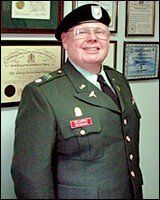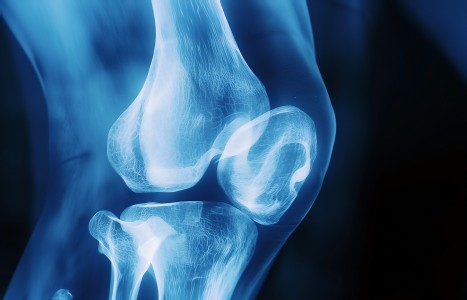While there may be no “magic bullet” when it comes to health, this should not dissuade patients or practitioners from seeking out ingredients that offer multiple health benefits. When it comes to dietary supplements, there are thousands upon thousands of choices. So, why not choose one that can address pain and assist with mental health? A supplement that can address inflammation, while also preventing certain types of cancer.
| Digital ExclusiveDC Interviews Dr. Patrick Delamere of the N.Y. Guard
When Patrick Delamere graduated from the Atlantic States Chiropractic Institute in 1962, the chiropractic profession was in a place quite different than it is now. A handful of states, including New York, which was home to Atlantic States, had yet to have licensing laws in effect for doctors of chiropractic. New York was the location of not one, but three operating chiropractic schools: Atlantic States, the Chiropractic Institute of New York and the Columbia College of Chiropractic. And the American Medical Association was in the process of embarking on its conspiratorial plan to "contain and eliminate" the spread of chiropractic.

Chiropractic survived the turbulent times of the 1960s, and so did Dr. Delamere. Since his graduation 44 years ago, he has become a symbol of the profession's progress in the state of New York, maintaining private practices in the Bronx and (later) Mahopac while furthering his education and training. Since 1998, he also has served as a member of the all-volunteer New York Guard, providing care to troops at Camp Smith, a training center in Cortland Manor. In 2005, he was promoted to the rank of commander of the 244th Medical Clinic at Camp Smith, making him the first doctor of chiropractic to be in command of a military unit in the United States.
So, how does it feel to be one of the highest ranking chiropractors in the military? This is one of the many questions Dynamic Chiropractic posed to Dr. Delamere in a recent interview.
Dynamic Chiropractic (DC): How did you get involved with the New York Guard?
Dr. Patrick Delamere (PD): In 1998, I visited the headquarters of the New York Army Guard at Camp Smith in Cortland Manor. I met with the chief surgeon, and after reading my CV, he decided, based upon my years of experience and because I had taken some postgraduate courses at the New York Medical College, to place me in the medical unit at Camp Smith. I was commissioned as a captain in the Medical Services Unit. At that time, there was no military designation for a DC.
The following spring, I signed up for the Latham Clinic at Camp Smith. It had been under the auspices of the Army National Guard, but they were moving their medical unit to another military installation. I became the clinic administrator and was promoted to the rank of major that year.
About that time, President Clinton signed a bill that authorized chiropractic care for all of the military. As a matter of fact, the past three presidents have signed legislation for having chiropractors in the military. We were the first military organization I knew about that had a chiropractic unit. My commander at that time was a triple-boarded surgeon. He was really impressed with some of the results we were getting with the soldiers under chiropractic care. He gave me a free hand to start a chiropractic unit. I was named chief of chiropractic services, and I began looking for other chiropractors to join.
We also had help from the members of the Chiropractic Oversight Advisory Committee, and we had a lot of help from the DCs who were already practicing as civilian employees with the military. They gave us a lot of insight in getting the chiropractic unit organized. We ended up with five chiropractors at the end of 2000. Going into 2001, people were becoming more aware of us at Camp Smith.
The first chiropractor to join was a friend of mine, Dr. Floyd Miller. He was officially commissioned as a chiropractor in July 2001. That's the first time I know of that a chiropractor had been commissioned in any form in the military. [Recall that up to that point, there had been no official military designation for a doctor of chiropractic.]
When 9/11 occurred, the 42nd Infantry Division attached the entire 244th Medical Clinic to their unit because of the vast numbers of soldiers who were coming through Camp Smith, either going into New York City or coming back. We were attached to the 42nd until they went home.
When 9/11 occurred, the troops were activated extremely fast, and they were coming into Camp Smith from all over the state. There were neck injuries and back injuries. It's much like what we hear coming out of Iraq these days. Fifty-three percent of the injuries coming back from Iraq are neck and back injuries. Fifty-three percent of the injuries coming back from Iraq need chiropractic care. They're not all getting it now, but we had the opportunity during 9/11 to give chiropractic care to these troops, and they really appreciated it.
Toward the end of the tour of duty for 9/11, we were on duty 24-7. We were activated at 11:50 a.m. on 9/11 and were on duty until January 2002. Toward the end of the duty, they began to reduce the staff to a skeleton crew. One of the generals insisted that we keep a chiropractor on duty 24-7 because of the effectiveness chiropractic had shown during the activation. We saw countless numbers of troops in and out, and we only had two rooms to work in at that time, because we were a new part of the 244th, but there were many days when more of the patients who came in wanted chiropractic instead of taking medications. When that occurred, the general saw fit to make sure we had a chiropractor on staff. They had two of us on duty rotating around the clock so there would always be a chiropractor for the troops.
DC:What led to your being named commander of the 244th?
PD: My commander was promoted to division surgeon. I was the next in line in rank; I was the highest ranking officer in the medical unit. Between the time we started and that point, we had really built up the chiropractic ranks. Right after 9/11, the chiropractic unit got to be very well-noticed because of all of the soldiers who would rather be treated with chiropractic and go back to duty than be sent home. In the months that we were activated, we lost only one person, who had a nervous breakdown. The chiropractic unit began to grow at that time. We had chiropractors from all over the state who wanted to join us.
Right now, in western New York, Dr. Ali Jefari is one of our officers. He's the deputy chief of chiropractic for western New York and the chairman of the New York Board of Chiropractic Examiners. We also have Dr. Jonathan McCullough, who came in right after 9/11. He's the chairman of the board of chiropractic examiners for the state of Pennsylvania; he also has a New York license.
The enthusiasm and the swell of chiropractors in Camp Smith began to make us noticed. For example, we wanted to get some equipment. The Lloyd Table Company gave us one of their best elevated drop tables. Dr. Arlan Fuhr from Activator gave us five Activators to use in the clinic. He even gave us an extra one to present to the Israeli Air Force in October. Biofreeze gave us thousands of packets, which we gave out and still give out to the soldiers. Our commanding general was totally aware of what the chiropractic unit had accomplished.
DC: How is the medical unit structured? How many health care providers are involved?
PD: We have five physicians, two dentists, two podiatrists, four pharmacists, a physician's assistant, a large group of nurses in different phases of nursing, a lot of EMTs - and six chiropractors. There's a great deal of interest in the medical unit because we're based at Camp Smith, and because we're the New York Guard, we cannot be deployed outside the state.
About the New York Guard - we're a volunteer New York state defense force. We were organized in 1917 to take over the armories and guard the watershed properties when the National Guard was sent to France. Our responsibility is to support the National Guard in whatever they do. We're under the Division of Military and Naval Affairs, an adjutant general and the governor. Because we're volunteers, we get paid only when we're activated. We're not paid for the drills that we have on a regular basis, or the studies and classes we do, but the volunteer spirit among all of these people has had a tremendous influence upon the people in the state of New York since 9/11.
DC: What's a typical week like being in charge of the clinic? Do you still see patients?
PD: I still see patients in my own office, but I do mostly nutritional and health management consulting now. I started a PhD in health administration and finished all of my exams. I'm still in the process of completing my dissertation. I practice part-time in the office here, but my son, Dr. Brendan Delamere, has full direction of the office in our chiropractic practice.
I receive between 20 and 30 e-mails a day on New York Guard-related matters. We have an administration meeting every Tuesday and a drill one Saturday a month. We also have programs set up to continually educate the troops on all types of possible injuries. Right now, we're doing a combat lifesaver course sponsored by New York Chiropractic College that will take us into May. The entire 244th Medical Clinic is taking that course at the moment. Our job right now is to take care of our own people and be prepared to take care of anyone else who comes into the clinic, but also to look ahead so that if anything else happens, we can be organized as quickly as possible, and be able to function as a close-knit unit. The responsibility at this point is to educate, educate, educate.
DC:What's the general feeling about a doctor of chiropractic being in command of a unit that has medical doctors and other health care providers? How does everyone get along?
PD: We get along very well. We have a close-knit group, and everyone knows what the other's responsibility is. Each one of us respects the discipline of the other. We have insight on patients who are brought in. We have insight from the different physicians, the chiropractors, the nursing staff and the physician's assistant.
We have a really tight-knit group at the moment, and one of the reasons I think we do is because they understand full well that chiropractic works. The physicians there get along very well with me. Because I'm the commander, they have to follow orders, but on the other hand, the basis of our closeness is that we respect one another's position.
A good example of what I just said occurred at the annual training two years ago. I was approached by a physician who had a soldier lying in one of the resting rooms with a blood pressure of 160 over 110. After taking a thorough case history, the physician said he thought it was stress-related. He asked if I would be willing to work on the patient's neck and back to see if I could lower the blood pressure. I agreed completely. I said, "As long as you stay with him, if you can monitor the blood pressure, I'll work on his nervous system."
The physician hooked him up to the blood pressure cuff. I adjusted him. In a few minutes, he calmed down, but there wasn't any tremendous improvement right then and there with the blood pressure. The physician recommended that the soldier go back to the barracks and rest. We checked him early the next morning, and the soldier's blood pressure was 120 over 80. This was a physician whose specialty was ophthalmology, and who saw a lot of pressure in this person's neck and head, and he realized that it wasn't a cause for medication or sending him to the hospital. He'd seen us work before and seen the results of chiropractic in the clinic. That was an interesting observation of watching a physician come to me and ask me if I would check a patient with high blood pressure, and the physician's assessment that I could help was correct.
DC: How does it feel to be one of the highest ranking chiropractors in the military?
PD: It's very humbling. It gives me a great deal of respect for our profession, and what our profession has done and gone through in the past 44 years. When I came out of school, we basically sat in the back of the bus. Now, chiropractors are in the government, and a chiropractor is the commander of a medical unit.
DC:What do you think all of this says about the future of chiropractic?
PD: As I see it, the best is yet to come. I believe the chiropractic profession hasn't really come into its own yet. I think it's just starting, and to be a commander in a medical unit and see that each of these medical people respects your discipline is very humbling.
The vision I have for chiropractic and for my profession is far greater for the next 25 years than the past 25 years. I was at a seminar in Orlando a few weeks ago. I looked at some of these young practitioners with fire and zeal for truth, for our profession, for our philosophy, that has yet to burst forth. I believe that we haven't even begun to understand the benefits that will happen if we can only keep focusing on taking care of the patients and not be sidelined by the negativity around us. We need to keep focusing on the fact that chiropractic works. It's always worked. It worked when I got out of school. It works now. It works great on soldiers. The future, I think, will be better as long as the chiropractors are looking for that. It's going to get better and better continually.
Let me give you an example of what happened with one soldier that was sent to my office a couple of years ago. He was in a firefight in Vietnam. During the firefight, he leaned to his left side to reach for some ammunition. When that occurred, he was struck by a round in the nose. Because of the firefight, he couldn't do anything; he had to continue in support of the rest of his people. When the battle was over, he had stopped bleeding. He never lost consciousness, but he had some pain in his head. He went to the medical unit later on. They took an X-ray and found a bullet still in his head. When they took it out, it affected the trigeminal nerve. As a result, he didn't experience a day after the surgery in which he wasn't in pain or on pain medication. This went on for 35 years.
He came into my office in Camp Smith to see if anything could be done. We took an X-ray and found a severely subluxated atlas anterior. In three visits, all of his pain stopped. The man had carried this pain for 35 years after Vietnam, but because of what chiropractic did, everything stopped completely. He was off all pain medications the last time I saw him. He came in from Florida to see me last year at the annual training at Camp Smith to say hello and to thank me one more time for what I had done.
It was a simple thing that any chiropractor can do, and most chiropractors are doing it thousands of times every day throughout this country. If we can keep focused on that unique ability that we have to correct structure and function, we'll keep growing, and we'll keep getting better and better.
DC:Any final comments?
PD: Here's my plea to the chiropractors of this country. Contact your senators and representatives in Washington, D.C. to motivate all branches of the military to commission chiropractors in the services. The chiropractors who are doing a great job as civilian employees have a three times greater satisfaction rate with their work than the medical treatment for different conditions. If you look at the statistics and see what's happening, this country needs more chiropractors in the military. We need our representatives and senators to motivate the Department of Defense to take better care of our troops. The bills have been signed and all of the work has been done. They just need to get it implemented.
If people want to join the New York Guard, they can send an e-mail to Dr. Floyd Miller. He's the chief chiropractor at Camp Smith; his e-mail is chirolife@aol.com. If anybody wants to get in touch with me, my e-mail is drdelamere@aol.com, and my Web site is www.drdelamere.org. I'll be happy to share more of my story with anyone who is interested.
I'd also like to thank your publisher for giving the New York Guard, the 244th Medical Clinic, and especially the chiropractors this opportunity. We'd all like to thank him for giving us an opportunity to bring this to the attention of the nation.
DC: Thank you.



